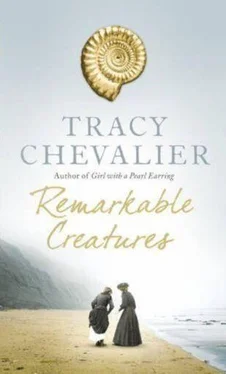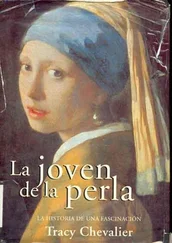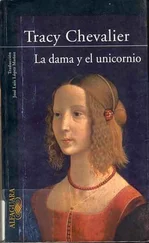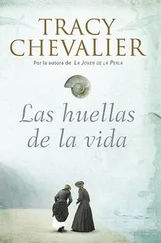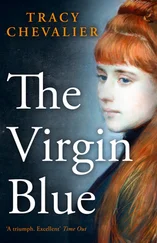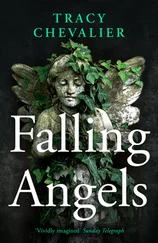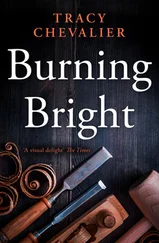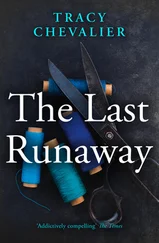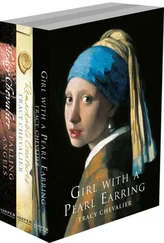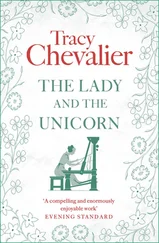
Tracy Chevalier
Remarkable Creatures
This is for my son, Jacob
1. Different from all the rocks on the beach
Lightning has struck me all my life. Just once was it real. I shouldn’t remember it, for I was little more than a baby. But I do remember. I was in a field, where there were horses and riders performing tricks. Then a storm blew in, and a woman-not Mam-picked me up and brought me under a tree. As she held me tight I looked up and saw the pattern of black leaves against a white sky.
Then there was a noise, like all the trees falling down round me, and a bright, bright light, which was like looking at the sun. A buzz run right through me. It was as if I’d touched a hot coal, and I could smell singed flesh and sense there was pain, yet it weren’t painful. I felt like a stocking turned inside out.
Others begun pulling at me and calling, but I couldn’t make a sound. I was carried somewhere, then there was warmth all round, not a blanket, but wet. It was water and I knew water-our house was close to the sea, I could see it from our windows. Then I opened my eyes, and it feels like they haven’t been shut since.
The lightning killed the woman holding me, and two girls standing next to her, but I survived. They say I was a quiet, sickly child before the storm, but after it I grew up lively and alert. I cannot say if they’re right, but the memory of that lightning still runs through me like a shiver. It marks powerful moments of my life: seeing the first crocodile skull Joe found, and finding its body myself; discovering my other monsters on the beach; meeting Colonel Birch. Other times I’ll feel the lightning strike and wonder why it’s come. Sometimes I don’t understand, but accept what the lightning tells me, for the lightning is me. It entered me when I was a baby and never left.
I feel an echo of the lightning each time I find a fossil, a little jolt that says, “Yes, Mary Anning, you are different from all the rocks on the beach.” That is why I am a hunter: to feel that bolt of lightning, and that difference, every day.
2. An unladylike pursuit, dirty and mysterious
Mary Anning leads with her eyes. That was clear even the first time we met, when she was but a girl. Her eyes are button brown, and bright, and she has a fossil hunter’s tendency always to be looking for something, even when on the street or in a house where there is no possibility of finding anything of interest. It makes her appear vigorous, even when she is still. I have been told by my sisters that I too glance about rather than hold a steady gaze, yet they do not mean it as a compliment as I do with Mary.
I have long noted that people tend to lead with one particular feature, a part of the face or body. My brother, John, for instance, leads with his eyebrows. It is not just that they form prominent tufts above his eyes, but they are the part of his face that moves the most, tracing the course of his thoughts as his brow furrows and clears. He is the second eldest of the five Philpot siblings, and the only son, which made him responsible for four sisters after our parents’ death. Such circumstances will move anyone’s eyebrows, though even as a boy he was serious.
My youngest sister, Margaret, leads with her hands. Though small, their fingers are proportionately long and elegant, and she plays the piano better than the rest of us. She is given to waving her hands about as she dances, and when she sleeps she throws her arms above her head, even when the room is cold.
Frances has been the only Philpot sister to marry, and leads with her bosom-which I suppose explains that. We Philpots are not known for our beauty. Our frames are bony, our features strong. Moreover, there was really only family money enough for one sister to marry with ease, and Frances won the race, leaving Red Lion Square to become the wife of an Essex merchant.
I have always admired most those who lead with their eyes, like Mary Anning, for they seem more aware of the world and its workings. That is why I get on best with my eldest sister, Louise. She has grey eyes, like all the Philpots, and says little, but when her eyes fix on you, you take notice.
I have always wanted to lead with my eyes as well, but I have not been so fortunate. I have a prominent jaw, and when I grit my teeth-more often than I ought, for the world frustrates me-it tenses and sharpens like an axe blade. At a ball once I overheard a potential suitor say he did not dare ask me to dance for fear of cutting himself on my face. I have never really recovered from that remark. It explains why I am a spinster, and why I dance so seldom.
I have longed to move from jaw to eye, but I have noticed that people do not change which feature they lead with, any more than they change in character. And so I am stuck with my strong jaw that puts people off, set in stone like the fossils I collect. Or so I have thought.
I met Mary Anning in Lyme Regis, where she has lived all her life. It was certainly not where I expected to live. London was, of course, specifically Red Lion Square, where we Philpots grew up. Though I had heard of Lyme, as one does of seaside resorts when they become fashionable, we had never visited. We usually went to Sussex towns such as Brighton or Hastings during the summer. When she was alive our mother was keen for us to breathe the fresh air and bathe in the sea, for she subscribed to the views of Doctor Richard Russell, who had written a dissertation about the benefit of sea water, to bathe in and to drink as well. I refused to drink sea water, but I did swim sometimes. I was at home by the sea, though I never thought that would become a literal truth.
Two years after our parents’ death, however, my brother announced at dinner one evening his engagement to the daughter of one of our late father’s solicitor friends. We kissed and congratulated John, and Margaret played a celebratory waltz on the piano. But in bed that night I wept, as I suspected my sisters did as well, for our London lives as we knew them were over. Once our brother married there would be neither the place nor the money for us all to live at Red Lion Square. The new Mrs Philpot would of course want to be mistress of her own home, and fill the house with children. Three sisters was a surfeit, especially when we were unlikely to marry. For Louise and I both knew we were destined to remain spinsters. Because we had little money, our looks and characters were meant to attract husbands, yet ours were too irregular to help us. Though her eyes lifted and brightened her face, Louise was very tall-far taller than most men could manage-and had large hands and feet. Moreover, she was so quiet that suitors were unnerved by her, thinking she was judging them. She probably was. As for me, I was small and bony and plain, and I could not flirt, but would try to talk about serious things, and that drove the men away too.
We were to be moved on, then, like sheep shifted from one cropped field to another. And John must be our shepherd.
The next morning he laid on the breakfast table a book he had borrowed from a friend. “I thought for your summer holiday you might like to go somewhere new rather than visit our aunt and uncle in Brighton again,” he suggested. “A little tour, if you like, along the south coast. With the war with France cutting off travel to the Continent, so many more coastal resorts are springing up. There may be places you will like even more than Brighton. Eastbourne, perhaps, or Worthing. Or further afield, to Lymington, or the Dorset coast: Weymouth or Lyme Regis.” John was reciting these places as if going down a list in his head, placing a little tick beside each one as he named it. That was how his tidy solicitor’s mind worked. He had clearly thought through where he wanted us to go, though he would herd us there gently. “Have a look to see what you fancy.” John tapped the book. Although he said nothing, we all knew we were looking not simply for a holiday destination, but for a new home, where we could live in gently diminished circumstances rather than as London paupers.
Читать дальше
Конец ознакомительного отрывка
Купить книгу
